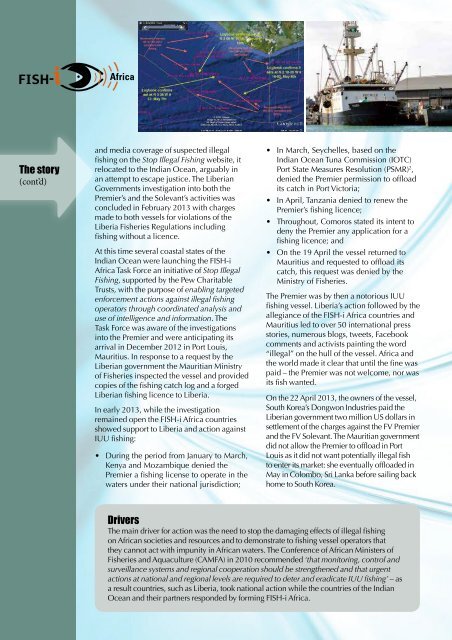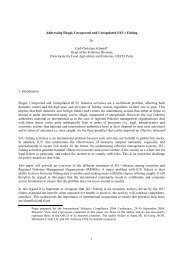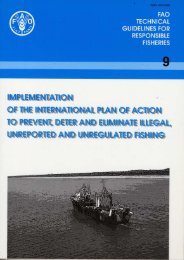Stop Illegal Fishing Case Study Series 7 - International MCS Network
Stop Illegal Fishing Case Study Series 7 - International MCS Network
Stop Illegal Fishing Case Study Series 7 - International MCS Network
You also want an ePaper? Increase the reach of your titles
YUMPU automatically turns print PDFs into web optimized ePapers that Google loves.
The story(cont’d)and media coverage of suspected illegalshing on the <strong>Stop</strong> <strong>Illegal</strong> <strong>Fishing</strong> website, itrelocated to the Indian Ocean, arguably inan attempt to escape justice. The LiberianGovernments investigation into both thePremier’s and the Solevant’s activities wasconcluded in February 2013 with chargesmade to both vessels for violations of theLiberia Fisheries Regulations includingshing without a licence.At this time several coastal states of theIndian Ocean were launching the FISH-iAfrica Task Force an initiative of <strong>Stop</strong> <strong>Illegal</strong><strong>Fishing</strong>, supported by the Pew CharitableTrusts, with the purpose of enabling targetedenforcement actions against illegal shingoperators through coordinated analysis anduse of intelligence and information. TheTask Force was aware of the investigationsinto the Premier and were anticipating itsarrival in December 2012 in Port Louis,Mauritius. In response to a request by theLiberian government the Mauritian Ministryof Fisheries inspected the vessel and providedcopies of the shing catch log and a forgedLiberian shing licence to Liberia.In early 2013, while the investigationremained open the FISH-i Africa countriesshowed support to Liberia and action againstIUU shing:• During the period from January to March,Kenya and Mozambique denied thePremier a shing license to operate in thewaters under their national jurisdiction;• In March, Seychelles, based on theIndian Ocean Tuna Commission (IOTC)Port State Measures Resolution (PSMR) 2 ,denied the Premier permission to ofoadits catch in Port Victoria;• In April, Tanzania denied to renew thePremier’s shing licence;• Throughout, Comoros stated its intent todeny the Premier any application for ashing licence; and• On the 19 April the vessel returned toMauritius and requested to ofoad itscatch, this request was denied by theMinistry of Fisheries.The Premier was by then a notorious IUUshing vessel. Liberia’s action followed by theallegiance of the FISH-i Africa countries andMauritius led to over 50 international pressstories, numerous blogs, tweets, Facebookcomments and activists painting the word“illegal” on the hull of the vessel. Africa andthe world made it clear that until the ne waspaid – the Premier was not welcome, nor wasits sh wanted.On the 22 April 2013, the owners of the vessel,South Korea’s Dongwon Industries paid theLiberian government two million US dollars insettlement of the charges against the FV Premierand the FV Solevant. The Mauritian governmentdid not allow the Premier to ofoad in PortLouis as it did not want potentially illegal shto enter its market: she eventually ofoaded inMay in Colombo, Sri Lanka before sailing backhome to South Korea.DriversThe main driver for action was the need to stop the damaging effects of illegal shingon African societies and resources and to demonstrate to shing vessel operators thatthey cannot act with impunity in African waters. The Conference of African Ministers ofFisheries and Aquaculture (CAMFA) in 2010 recommended ‘that monitoring, control andsurveillance systems and regional cooperation should be strengthened and that urgentactions at national and regional levels are required to deter and eradicate IUU shing’ – asa result countries, such as Liberia, took national action while the countries of the IndianOcean and their partners responded by forming FISH-i Africa.
















